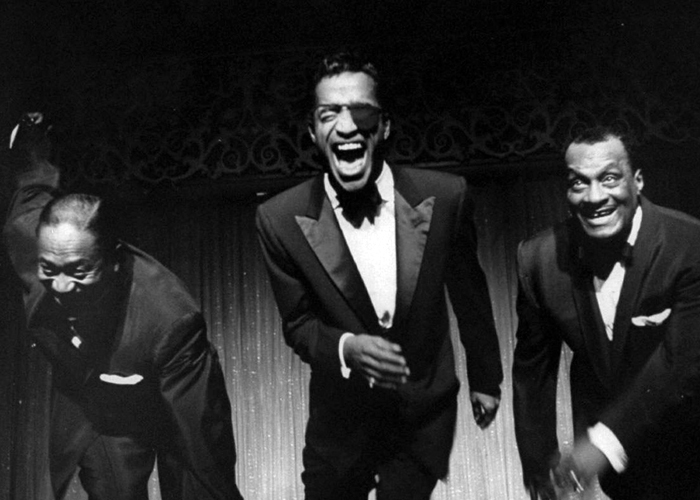Overview
Biographical Articles
Born into vaudeville, he performed from age 3 across the United States with his father, Sammy Davis, Sr. and Will Mastin, as The Will Mastin Trio. Through the ‘40s and ‘50s, Davis became an electrifying nightclub performer, for whom the whole was greater than the sum of his parts. He had been brought up as a ‘flash’ tap dancer, could mimic the singing styles of famous singers of the day, had been mentored by Frank Sinatra to sing in his own voice, and was a self-taught musician (playing the drums, vibraphone, trumpet, and more). He was also the first black entertainer to perform comic impressions of white non-singer celebrities to white audiences.
Sammy was a cultural icon of the 1960s – as a member of the so-called “Rat Pack” with Sinatra and Dean Martin, as a prominent activist in the civil rights movement, and as a seemingly ubiquitous presence on television, on vinyl, in concert, on the Broadway stage, on the bookshelves, or at the cinema.
Davis’s reputation took a hit in the 1970s as his desperate need to stay on top of the showbiz world saw him adopt the latest fashion fads, abuse booze and drugs, and unfortunately cultivate a lasting image of himself as a profligate ageing hipster. In 1978, with his return to Broadway and intervention from doctors and friends about his substance abuse, Sammy’s life began to turn around.
By 1982, Davis was back on top of his game, and toured the globe to his former acclaim, including a smash-hit worldwide tour with Sinatra and Liza Minelli in 1988-89. In 1987, Davis, who by this stage was a Grammy, Tony, Emmy, and Golden Globe nominee, was an Honoree at the Kennedy Centre Honors. When Sammy passed away from throat cancer in 1990, he was universally hailed as an icon of the entertainment world. He was posthumously awarded a Grammy Lifetime Achievement Award in 2001.
Born into vaudeville, he performed from age 3 across the United States with his father, Sammy Davis, Sr. and Will Mastin, as The Will Mastin Trio. Through the ‘40s and ‘50s, Davis became an electrifying nightclub performer, for whom the whole was greater than the sum of his parts. He had been brought up as a ‘flash’ tap dancer, could mimic the singing styles of famous singers of the day, had been mentored by Frank Sinatra to sing in his own voice, and was a self-taught musician (playing the drums, vibraphone, trumpet, and more). He was also the first black entertainer to perform comic impressions of white non-singer celebrities to white audiences.
Sammy was a cultural icon of the 1960s – as a member of the so-called “Rat Pack” with Sinatra and Dean Martin, as a prominent activist in the civil rights movement, and as a seemingly ubiquitous presence on television, on vinyl, in concert, on the Broadway stage, on the bookshelves, or at the cinema.
Davis’s reputation took a hit in the 1970s as his desperate need to stay on top of the showbiz world saw him adopt the latest fashion fads, abuse booze and drugs, and unfortunately cultivate a lasting image of himself as a profligate ageing hipster. In 1978, with his return to Broadway and intervention from doctors and friends about his substance abuse, Sammy’s life began to turn around.
By 1982, Davis was back on top of his game, and toured the globe to his former acclaim, including a smash-hit worldwide tour with Sinatra and Liza Minelli in 1988-89. In 1987, Davis, who by this stage was a Grammy, Tony, Emmy, and Golden Globe nominee, was an Honoree at the Kennedy Centre Honors. When Sammy passed away from throat cancer in 1990, he was universally hailed as an icon of the entertainment world. He was posthumously awarded a Grammy Lifetime Achievement Award in 2001.












